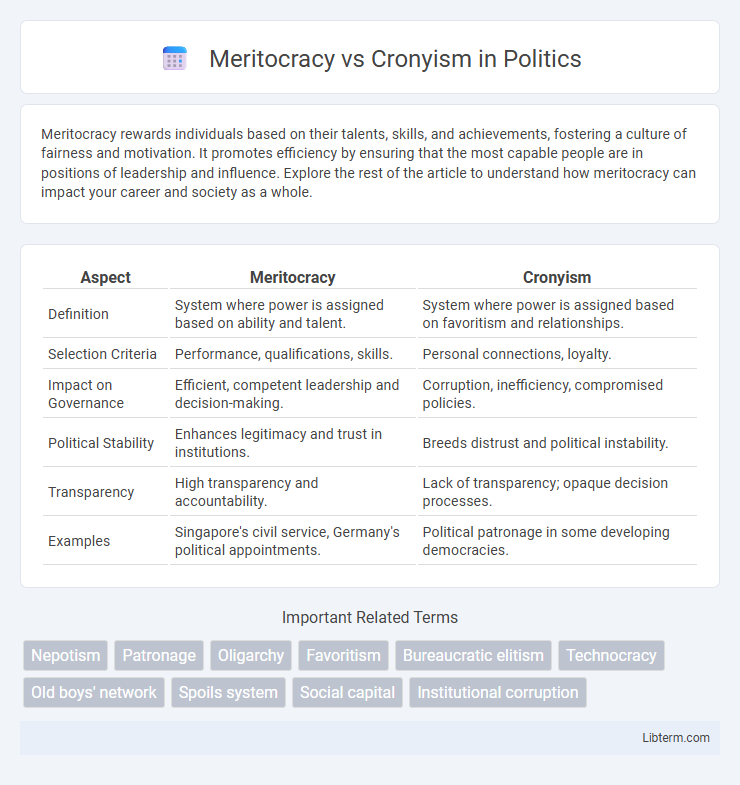Meritocracy rewards individuals based on their talents, skills, and achievements, fostering a culture of fairness and motivation. It promotes efficiency by ensuring that the most capable people are in positions of leadership and influence. Explore the rest of the article to understand how meritocracy can impact your career and society as a whole.
Table of Comparison
| Aspect | Meritocracy | Cronyism |
|---|---|---|
| Definition | System where power is assigned based on ability and talent. | System where power is assigned based on favoritism and relationships. |
| Selection Criteria | Performance, qualifications, skills. | Personal connections, loyalty. |
| Impact on Governance | Efficient, competent leadership and decision-making. | Corruption, inefficiency, compromised policies. |
| Political Stability | Enhances legitimacy and trust in institutions. | Breeds distrust and political instability. |
| Transparency | High transparency and accountability. | Lack of transparency; opaque decision processes. |
| Examples | Singapore's civil service, Germany's political appointments. | Political patronage in some developing democracies. |
Understanding Meritocracy: Definition and Principles
Meritocracy is a system where individuals advance based on ability, talent, and achievements rather than personal connections or wealth. The core principles emphasize fairness, equal opportunity, and rewarding hard work and skills to ensure the most competent individuals lead. This contrasts sharply with cronyism, where favoritism undermines merit-based progress, leading to inefficiency and inequality.
Defining Cronyism: How Favoritism Shapes Organizations
Cronyism refers to the practice of favoring friends, relatives, or loyal associates in organizational appointments and decisions, often regardless of merit or qualifications. This favoritism undermines fair competition and meritocratic principles, leading to inefficiencies, decreased morale, and a lack of innovation within organizations. Cronyism distorts resource allocation and decision-making processes, ultimately harming organizational performance and credibility.
Historical Roots of Meritocracy and Cronyism
Meritocracy traces its roots to ancient China's civil service examinations during the Han dynasty, emphasizing talent and effort as key to governance. Cronyism has origins in feudal societies where loyalty and personal relationships influenced power distribution. These contrasting systems shaped political and social structures, with meritocracy promoting efficiency and cronyism often leading to corruption.
Key Differences Between Meritocracy and Cronyism
Meritocracy promotes advancement based on individual skills, achievements, and qualifications, ensuring efficiency and fairness in organizations. Cronyism, contrastingly, prioritizes favoritism toward friends or associates, often leading to nepotism and reduced productivity. Key differences include merit-based rewards versus loyalty-based appointments, transparency versus secrecy, and long-term organizational growth versus short-term personal gains.
Impacts on Workplace Productivity and Innovation
Meritocracy fosters workplace productivity and innovation by rewarding talent and effort, leading to higher employee motivation and a culture of continuous improvement. Cronyism undermines merit-based decisions, resulting in decreased morale, reduced efficiency, and stifled creativity as unqualified individuals occupy key positions. Organizations emphasizing meritocracy experience stronger innovation pipelines and sustainable competitive advantages compared to those plagued by favoritism.
Effects on Employee Motivation and Morale
Meritocracy fosters employee motivation and morale by rewarding skills, performance, and achievements, leading to increased productivity and job satisfaction. Cronyism undermines workplace fairness, causing resentment, decreased motivation, and higher turnover as favoritism overrides merit. Companies with merit-based cultures tend to attract and retain top talent, whereas cronyism erodes trust and hampers organizational growth.
Case Studies: Successes and Failures in Practice
Case studies of meritocracy reveal examples such as Singapore's economic development, where talent-based recruitment and performance evaluations significantly boosted productivity and governance. Conversely, cronyism in contexts like post-Soviet Russia illustrated how favoritism and nepotism led to resource misallocation, corruption, and economic stagnation. These contrasting outcomes demonstrate the critical impact of institutional frameworks on fair opportunity distribution and societal progress.
Challenges in Implementing True Meritocracy
Implementing true meritocracy faces significant challenges such as inherent social biases, unequal access to quality education, and entrenched power structures favoring cronyism. These obstacles distort fair evaluation processes, leading to nepotism and favoritism that undermine competence-based advancement. Overcoming these challenges requires systemic reforms emphasizing transparency, accountability, and equal opportunities across all levels of society.
Strategies to Prevent Cronyism in Organizations
Implementing transparent recruitment and promotion processes minimizes favoritism by ensuring merit-based evaluations. Establishing clear anti-corruption policies and regular audits deters unethical behaviors and reinforces accountability. Encouraging a culture of whistleblowing and protecting whistleblowers enhances detection and prevention of cronyism within organizations.
The Future of Fairness: Balancing Merit and Networks
Meritocracy emphasizes individual talent and effort as the basis for success, promoting fairness through objective performance metrics, while cronyism relies on personal connections and favoritism, often undermining equity. The future of fairness requires a balance that recognizes the value of both merit and social networks, creating systems that reward skill while ensuring opportunities are accessible regardless of background. Emerging technologies like AI-driven recruitment and transparent evaluation frameworks can help mitigate bias and foster merit-based advancement alongside network-building strategies.
Meritocracy Infographic

 libterm.com
libterm.com